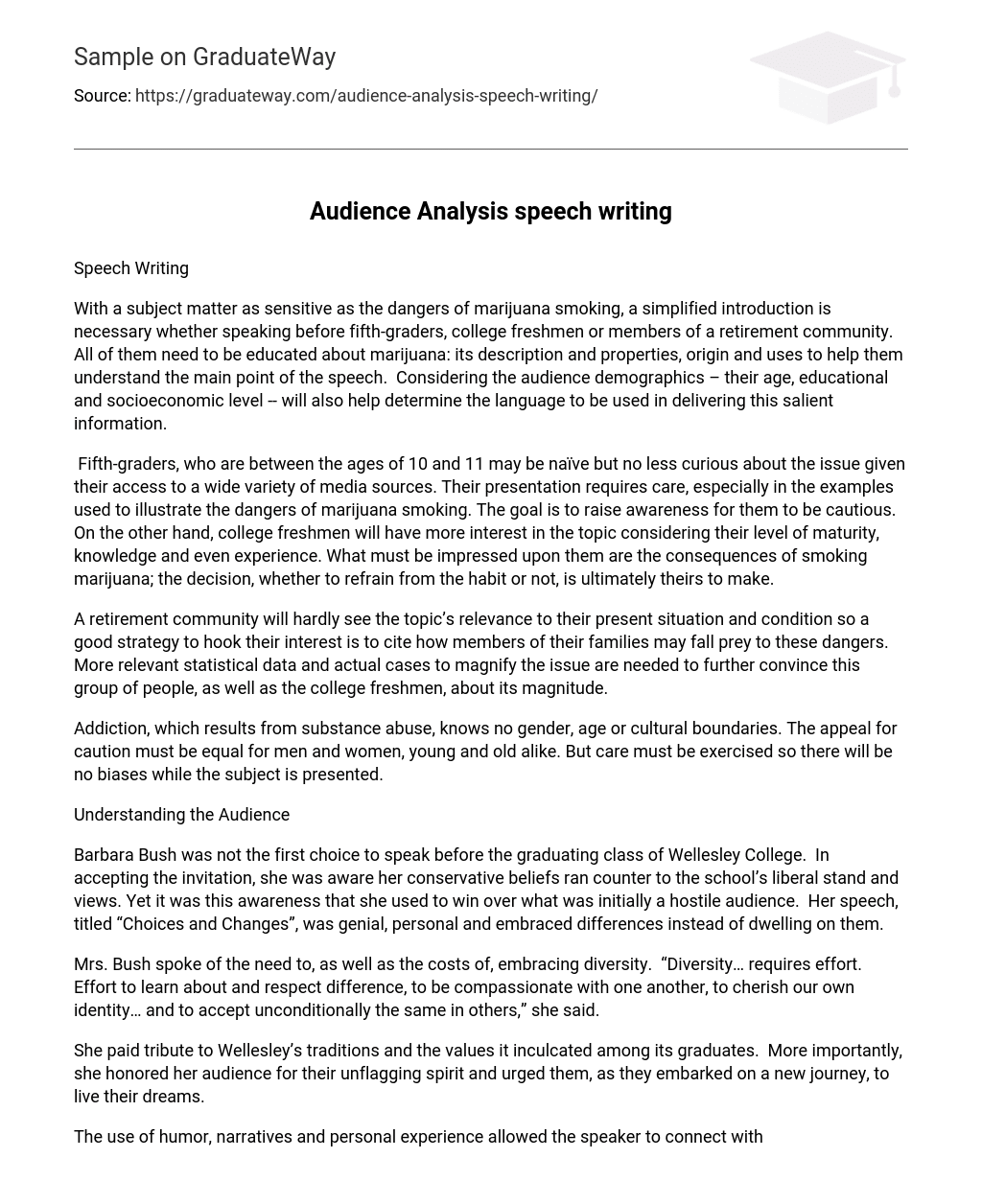Speech Writing
With a subject matter as sensitive as the dangers of marijuana smoking, a simplified introduction is necessary whether speaking before fifth-graders, college freshmen or members of a retirement community. All of them need to be educated about marijuana: its description and properties, origin and uses to help them understand the main point of the speech. Considering the audience demographics – their age, educational and socioeconomic level — will also help determine the language to be used in delivering this salient information.
Fifth-graders, who are between the ages of 10 and 11 may be naïve but no less curious about the issue given their access to a wide variety of media sources. Their presentation requires care, especially in the examples used to illustrate the dangers of marijuana smoking. The goal is to raise awareness for them to be cautious. On the other hand, college freshmen will have more interest in the topic considering their level of maturity, knowledge and even experience. What must be impressed upon them are the consequences of smoking marijuana; the decision, whether to refrain from the habit or not, is ultimately theirs to make.
A retirement community will hardly see the topic’s relevance to their present situation and condition so a good strategy to hook their interest is to cite how members of their families may fall prey to these dangers. More relevant statistical data and actual cases to magnify the issue are needed to further convince this group of people, as well as the college freshmen, about its magnitude.
Addiction, which results from substance abuse, knows no gender, age or cultural boundaries. The appeal for caution must be equal for men and women, young and old alike. But care must be exercised so there will be no biases while the subject is presented.
Understanding the Audience
Barbara Bush was not the first choice to speak before the graduating class of Wellesley College. In accepting the invitation, she was aware her conservative beliefs ran counter to the school’s liberal stand and views. Yet it was this awareness that she used to win over what was initially a hostile audience. Her speech, titled “Choices and Changes”, was genial, personal and embraced differences instead of dwelling on them.
Mrs. Bush spoke of the need to, as well as the costs of, embracing diversity. “Diversity… requires effort. Effort to learn about and respect difference, to be compassionate with one another, to cherish our own identity… and to accept unconditionally the same in others,” she said.
She paid tribute to Wellesley’s traditions and the values it inculcated among its graduates. More importantly, she honored her audience for their unflagging spirit and urged them, as they embarked on a new journey, to live their dreams.
The use of humor, narratives and personal experience allowed the speaker to connect with her audience on a deeper level, often leaving them with thoughts to further ponder on. Her audience would break into applause or hearty laughter in appreciation of her insights and comments.
One factor that worked in Mrs. Bush’s favor is that she was a woman speaking to women. That they were much younger did not alienate her; rather it allowed her to speak of “been-there-done-that” experiences with more credibility. She knew that while circumstances are far different now than it was during her time, their experiences will be no less exacting, and their choices just as diverse.
What may have truly endeared Mrs. Bush to her audience was her call for them to consider three special choices: to believe in something larger than themselves, to enjoy life, and to cherish human relationships. More than just issuing a challenge, it was a reminder that even before they began their quests to become achievers, they must realize that the true measure of success is what they will make of their family. “Your success as a family… our success as a society depends not on what happens in the White House, but on what happens inside your house.”
The speaker’s message was something her audience related to on a very personal level and this broke down any initial resistance they had for her. Mrs. Bush knew that in spite their differences in opinion or views, there was always common ground to be shared and valued among women. Ultimately, her sensitivity and understanding won them over, at least enough to give her the courtesy and respect she deserved during the occasion.
She used humorous anecdotes to lighten the mood, but tempered this with inspiring words and a heartfelt delivery.
It takes courage and skill to face a group of people who may look upon you with displeasure because of the ideals you espouse. But it takes sincerity to make them listen and see beyond differences; and even with each individual’s uniqueness, people can walk the same path, work toward the same goals and achieve the same dreams. Mrs. Bush is one such individual.
She understood audience psychology, but more importantly, she understood humanity.
References
CAS 100C – Course Commentary Audience Analysis. Retrieved February 8, 2008 from
https://cms.psu.edu/AngelUploads/Content/200708SPWD_…soc/5e83fd79627bce12a
2cd1e7530dc00CB/lesson05_04.html
Bush, B. (1990) Choices and Changes. Wellesley College 1990 Commencement Speech.
Retrieved February 8, 2008 from
http://www.wellesley.edu/PublicAffairs/Commencement/1990/bush.html





